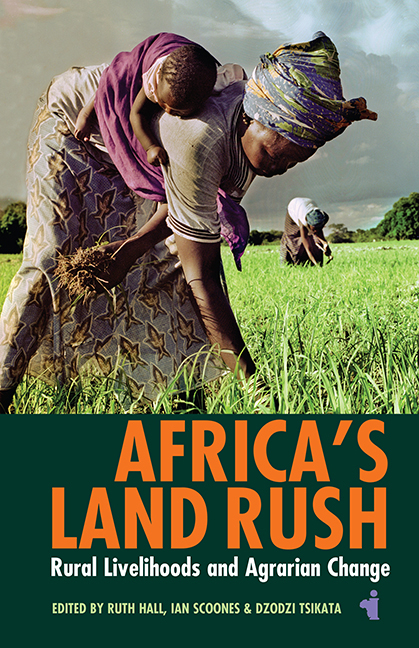Book contents
- Frontmatter
- Contents
- List of Maps, Tables & Figures
- Notes on Contributors
- Preface
- Acknowledgements
- List of Abbreviations
- 1 Introduction: The Contexts & Consequences of Africa’s Land Rush
- 2 State, Land & Agricultural Commercialisation in Kwara State, Nigeria
- 3 Recent Transnational Land Deals & the Local Agrarian Economy in Ghana
- 4 Large-Scale Land Acquisitions in Ethiopia: Implications for Agricultural Transformation & Livelihood Security
- 5 Land Deals & Pastoralist Livelihoods in Laikipia County, Kenya
- 6 Land Deals in the Tana Delta, Kenya
- 7 The State & Foreign Capital in Agricultural Commercialisation: The Case of Tanzania’s Kilombero Sugar Company
- 8 Trapped between the Farm Input Subsidy Programme & the Green Belt Initiative: Malawi’s Contemporary Agrarian Political Economy
- 9 Agrarian Struggles in Mozambique: Insights from Sugarcane Plantations
- 10 South African Commercial Farmers in the Congo
- References
- Index
9 - Agrarian Struggles in Mozambique: Insights from Sugarcane Plantations
Published online by Cambridge University Press: 21 May 2021
- Frontmatter
- Contents
- List of Maps, Tables & Figures
- Notes on Contributors
- Preface
- Acknowledgements
- List of Abbreviations
- 1 Introduction: The Contexts & Consequences of Africa’s Land Rush
- 2 State, Land & Agricultural Commercialisation in Kwara State, Nigeria
- 3 Recent Transnational Land Deals & the Local Agrarian Economy in Ghana
- 4 Large-Scale Land Acquisitions in Ethiopia: Implications for Agricultural Transformation & Livelihood Security
- 5 Land Deals & Pastoralist Livelihoods in Laikipia County, Kenya
- 6 Land Deals in the Tana Delta, Kenya
- 7 The State & Foreign Capital in Agricultural Commercialisation: The Case of Tanzania’s Kilombero Sugar Company
- 8 Trapped between the Farm Input Subsidy Programme & the Green Belt Initiative: Malawi’s Contemporary Agrarian Political Economy
- 9 Agrarian Struggles in Mozambique: Insights from Sugarcane Plantations
- 10 South African Commercial Farmers in the Congo
- References
- Index
Summary
Introduction
Mozambique is one of several countries in Southern Africa where big sugar companies have acquired land to produce cane, combining a nucleus estate and a mill, with an outgrower arrangement (Richardson 2010; Buur et al. 2011). This chapter focuses on the ways in which large-scale land investments are influencing agrarian structure, tenure dynamics, livelihood outcomes and social and institutional relationships around resources and investments in Mozambique. It looks at two cases: one established estate, and one proposed.
Since the early 2000s, Mozambique has been one of the main targets of large-scale land-based investments (Cotula et al. 2009; Nhantumbo and Salomão 2010; Hanlon 2011; Deininger et al. 2011). The country is endowed with abundant natural resources, fertile land and attractive investment policies. The combination of ‘abundant’ land for large-scale agriculture and expanding energy production, through natural gas and coal reserves, is core to its development plans.
Mozambique's national land legislation recognises its citizens’ customary tenure as constituting legal property rights and allows these land rights to be owned and transacted. The Constitution states that all land belongs to the state (Article no. 109) so, while the land is nationalised, the property rights of those who hold and use the land are protected in law. As elsewhere on the continent, investments in Mozambique have targeted land that is under customary tenure, land that is the least secure and easiest to negotiate (Alden Wily 2011b). In Mozambique, loopholes in the law combined with poor enforcement leave the commons vulnerable to appropriation (ibid.). This has led to growing concerns about on-going large-scale investments in agriculture and mining.
Government efforts to revive sugar estates and mills have attracted private investors to the sugar industry (Buur et al. 2011). Sugar production in Mozambique dates back to the mid-1960s when a private company, Sena Sugar Estates Ltd, set up operations. By 1972, the sugar industry was the third largest export sector and the biggest formal employer (Buur et al. 2011). However, the sector experienced a setback during the civil war and all the sugar mills were abandoned. In the 1990s, the post-war government intervened to ensure stability in the supply of sugar for both local and international markets.
- Type
- Chapter
- Information
- Africa's Land RushRural Livelihoods and Agrarian Change, pp. 150 - 161Publisher: Boydell & BrewerPrint publication year: 2015
- 3
- Cited by



